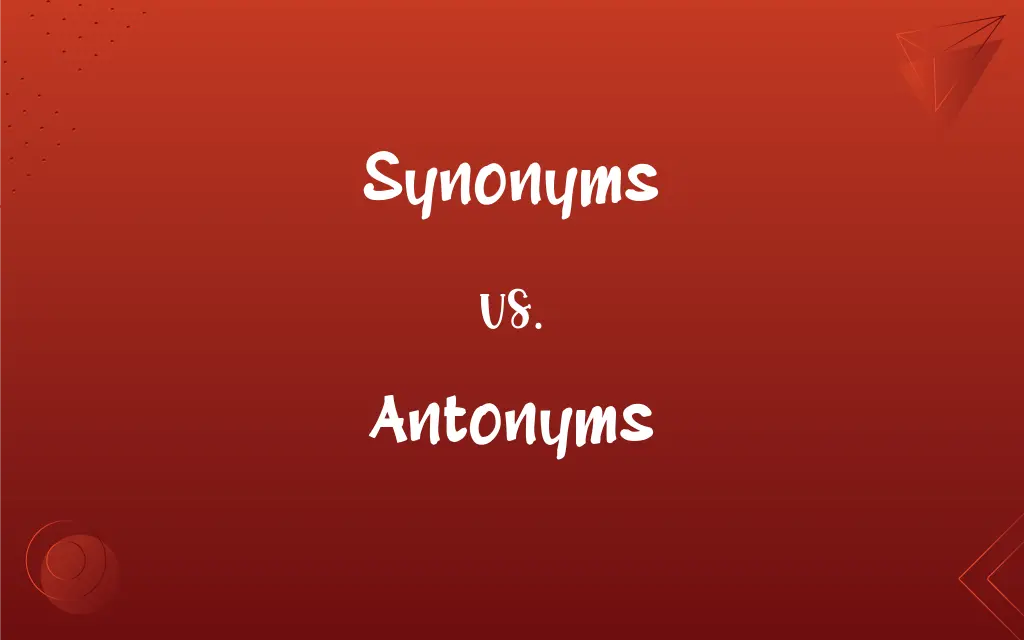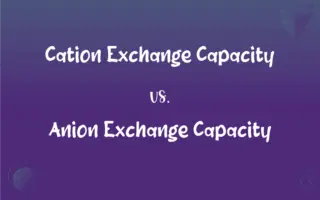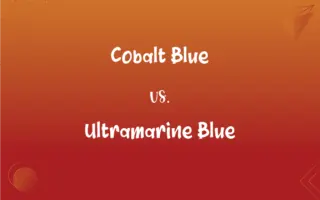Synonyms vs. Antonyms: What's the Difference?
Edited by Aimie Carlson || By Janet White || Published on November 10, 2024
Synonyms are words with similar meanings, such as "happy" and "joyful," while antonyms are words with opposite meanings, such as "happy" and "sad."

Key Differences
Synonyms are words that have the same or nearly the same meaning, allowing for more nuanced expression and variety in language. For example, "big," "large," and "huge" are synonyms because they all convey the idea of something being of considerable size. Antonyms, on the other hand, are words that have opposite meanings, providing a way to express contrast or opposition. For example, "big" and "small" are antonyms because they represent opposite ends of the size spectrum.
In the English language, synonyms are often used to avoid repetition and make writing or speech more interesting. For example, a writer might use the synonyms "terrified," "frightened," and "scared" interchangeably to describe a character's fear without sounding monotonous. Antonyms, on the other hand, are used to highlight differences or create a clear distinction between concepts. For example, describing a character as "brave" in one situation and "cowardly" in another emphasizes the contrast in their behavior.
Synonyms can have subtle differences in connotation or usage, which can affect the overall tone or meaning of a sentence. For example, "slender" and "skinny" both mean thin, but "slender" often has a positive connotation, while "skinny" can be negative. Antonyms, however, are more straightforward in their opposition, such as "hot" and "cold," which clearly represent opposite temperature extremes.
The use of synonyms and antonyms is an essential part of vocabulary development and language learning. Synonyms enhance one's ability to express themselves with precision and variety, while antonyms help in understanding and articulating contrasting ideas. Both are crucial for effective communication and comprehension in any language.
Synonyms and antonyms play vital roles in language by providing ways to express similarity and difference. Synonyms add depth and richness to speech and writing, while antonyms offer clarity and distinction. Mastery of both is key to a well-rounded vocabulary and effective communication.
ADVERTISEMENT
Comparison Chart
Meaning
Words with similar meanings
Words with opposite meanings
Purpose
To add variety and nuance
To highlight contrast or opposition
Usage
To avoid repetition
To emphasize differences
Connotation
Can vary subtly
Generally clear and straightforward
Example Pair
"Happy" and "joyful"
"Happy" and "sad"
ADVERTISEMENT
Synonyms and Antonyms Definitions
Synonyms
Synonyms are words that have the same or nearly the same meaning.
Beautiful and attractive are synonyms.
Antonyms
Antonyms can clarify the meaning by highlighting differences.
The solution was simple/complex, not complicated.
Synonyms
Synonyms can have slight differences in connotation or usage.
She was slender/skinny, but healthy.
Antonyms
Antonyms are words that have opposite meanings.
The weather was hot/cold yesterday.
Synonyms
Synonyms can be used interchangeably in similar contexts.
He was very happy/contented with the results.
Antonyms
Antonyms are used to express contrast or opposition.
She was brave/cowardly in the face of danger.
Synonyms
Synonyms enrich language by providing multiple ways to express an idea.
The movie was exciting/thrilling.
Antonyms
Antonyms can be absolute or gradable, depending on the context.
The glass was full/empty, with no middle ground.
Synonyms
Synonyms help avoid repetition in writing and speech.
The teacher was kind/generous to all her students.
Antonyms
Antonyms are essential for understanding the full range of a concept.
The room was full/empty when I arrived.
Synonyms
A word having the same or nearly the same meaning as another word or other words in a language.
Antonyms
A word having a meaning opposite to that of another word
The word "wet" is an antonym of the word "dry.".
Synonyms
A word or expression that serves as a figurative or symbolic substitute for another
"Romeo has become a synonym for any youthful lover" (Harry Levin).
Antonyms
Plural of antonym
Synonyms
(Biology) One of two or more scientific names that have been applied to the same species or other taxonomic group.
Synonyms
Inflection of synonym
FAQs
Can a word have multiple synonyms?
Yes, a word can have multiple synonyms, each with slightly different nuances.
What are synonyms?
Synonyms are words that have similar or nearly identical meanings.
How are antonyms used in writing?
Antonyms are used to highlight contrasts, clarify differences, and create emphasis.
Can a word have multiple antonyms?
Yes, a word can have multiple antonyms depending on the context.
How are synonyms used in writing?
Synonyms are used to add variety, avoid repetition, and express ideas more precisely.
Are antonyms always clear-cut?
No, antonyms can be absolute or gradable, with some having more nuanced opposition.
Can a word be both a synonym and an antonym of another word?
In rare cases, a word can be a synonym in one context and an antonym in another, but this is uncommon.
How can learning synonyms and antonyms improve vocabulary?
Learning synonyms and antonyms expands vocabulary, enhances communication skills, and improves language comprehension.
What are antonyms?
Antonyms are words with opposite meanings.
How do synonyms and antonyms contribute to language?
Synonyms enrich language by providing multiple ways to express ideas, while antonyms help clarify and distinguish concepts.
Can the context change the relationship between synonyms and antonyms?
Yes, context can influence whether words are considered synonyms or antonyms, as meanings can shift with different usage.
How do synonyms and antonyms relate to homonyms and homophones?
Homonyms and homophones are different concepts: homonyms are words that are spelled and pronounced the same but have different meanings, while homophones are words that sound the same but have different meanings and spellings. Synonyms and antonyms are related to meaning, not sound or spelling.
How do synonyms and antonyms help in learning a new language?
They help learners understand the range of meanings and opposites, aiding in vocabulary expansion and language comprehension.
Are there any online tools to find synonyms and antonyms?
Yes, there are many online thesauruses and dictionaries that provide lists of synonyms and antonyms.
Are there any rules for using synonyms and antonyms in sentences?
While there are no strict rules, it's important to consider the nuances of meaning, connotation, and context when using synonyms and antonyms.
Are there any exceptions to the definitions of synonyms and antonyms?
While the basic definitions are straightforward, there can be exceptions based on context, usage, and linguistic evolution.
Are synonyms always interchangeable?
No, synonyms may have subtle differences in connotation or usage, so they are not always interchangeable.
Can a word have both positive and negative synonyms or antonyms?
Yes, a word can have both positive and negative synonyms or antonyms, depending on the context and perspective.
How do synonyms and antonyms affect the tone of writing?
Synonyms can subtly alter the tone by choosing words with different connotations, while antonyms can create contrast and highlight differences in tone.
How do cultural differences affect the perception of synonyms and antonyms?
Cultural differences can influence how words are understood and used, affecting their perception as synonyms or antonyms in different contexts.
About Author
Written by
Janet WhiteJanet White has been an esteemed writer and blogger for Difference Wiki. Holding a Master's degree in Science and Medical Journalism from the prestigious Boston University, she has consistently demonstrated her expertise and passion for her field. When she's not immersed in her work, Janet relishes her time exercising, delving into a good book, and cherishing moments with friends and family.
Edited by
Aimie CarlsonAimie Carlson, holding a master's degree in English literature, is a fervent English language enthusiast. She lends her writing talents to Difference Wiki, a prominent website that specializes in comparisons, offering readers insightful analyses that both captivate and inform.







































































